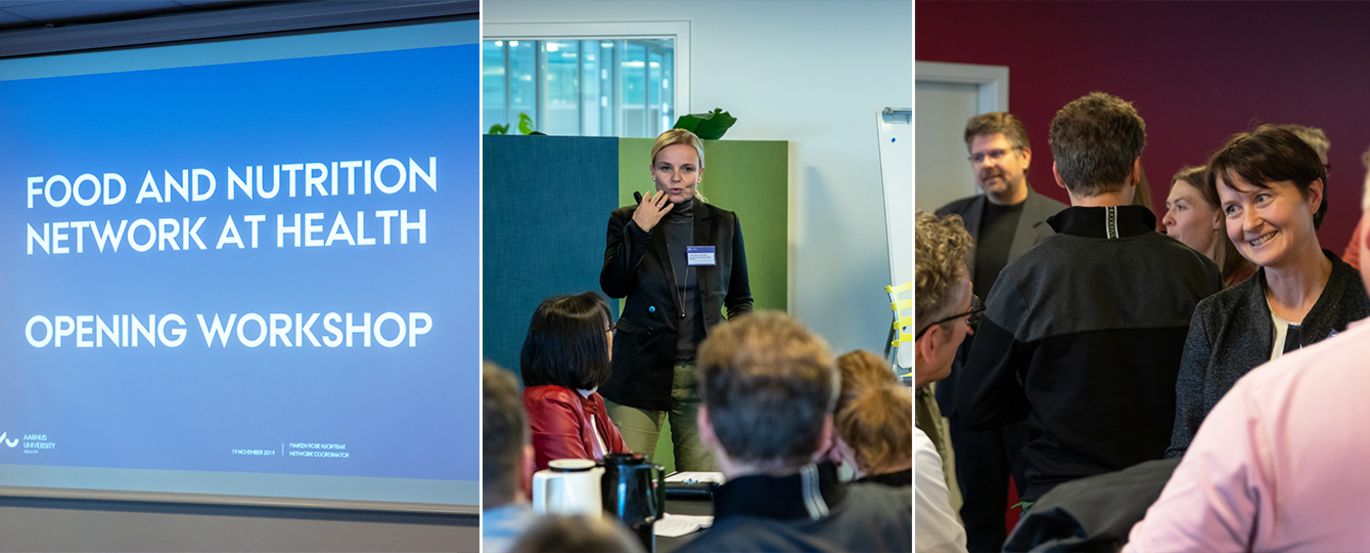Is there a protein researcher present?
Health does not have one single avowed food researcher, but the faculty has none the less succeeded in bringing together no less than sixty academic staff in a new interdisciplinary network based around food and nutrition in the context of health and disease. And they want even more!

Around sixty researchers from different departments, research units and hospital departments combine their knowledge about diet, health and disease in the interdisciplinary research collaboration The Food and Nutrition Network , which is backed by the faculty management team.
The goal is for clinical researchers, laboratory researchers and epidemiologists to become better at collaborating on identifying unacknowledged patterns and connections and making these visible, explains the chair of the network Niels Jessen, who is head of research at the Steno Diabetes Center Aarhus:
"No one at Health wants to call themselves food researchers, but there are a surprising number of us who work with elements of the correlation between diet and health," says Niels Jessen.
Synergy can be scheduled
“Because we don’t naturally run into one another on a daily basis, we need to allocate time to present and discuss research ideas, theories and results. This is the only way to find out whether who have one or more colleagues somewhere doing related research that helps enrich your own work – and vice versa,” he says.
Last week, the network brought together approx. forty members in an introductory workshop. PhD student Charlotte Rud and her supervisor, Consultant and Senior Hospital Physician Christian Lodberg Hvas , were among the researchers who made some useful contacts. Both come from the Department of Clinical Medicine and the Department of Hepatology and Gastroenterology at Aarhus University Hospital.
“I’m doing a PhD on protein supplements for patients with a small intestine colostomy, and after just a ninety minute network meeting, it was clear that Christian and I should have a meeting with Assistant Professor Mette Hansen from sport science at public health. We found out that she works with proteins in relation to health and performance, so that's very relevant for my project," says Charlotte Rud.
We work in small enclaves
Christian Lodberg Hvas is also pleasantly surprised by the outcome of what was a two hour investment on a Wednesday afternoon – both in general terms and more specifically:
"To think that just a few kilometres away there’s a famous protein researcher who knows a great deal about what Charlotte is doing. What a great illustration of the need to be more aware of each other's research," he says.
"Our work takes place in small enclaves, and it’s not as if you just go down to the main hall and shout 'Who knows something about protein absorption?’. Another good aspect is that this is an open scientific network where the meetings are organised by research directors from different active research environments. That guarantees credibility and quality,” says Christian Lodberg Hvas.
Alexander Fjældstad, postdoc at the Department of Clinical Medicine, is also satisfied with the network. He works with disruption of the sense of smell and taste at the Flavour Clinic at the Regional Hospital West Jutland.
"Many diseases and treatments such as diabetes, radiotherapy and chemotherapy, affect the sense of smell and taste, so I see many possibilities for research collaborations," says Alexander Fjældstad. He gave one of the presentations and subsequently received many curious questions about both the Flavour Clinic's patients and the knowledge they produce.
Just turn up
As revealed by the programme, the network accommodates presentations ranging from the importance of good saliva production and painless jaws to studies of depressive mice on junk food. For this reason, the faculty management team's observer in the network, Christian Lindholst, recommends joining up if you in any way carry out research in areas related to food and nutrition.
"I often hear researchers say they have to drop things they’d like to do, but here they should instead think over what they’ll be missing – and that is help to get an overview of a research area that’s extremely important for society. Also, you can be on the mailing list with no strings attached," says Christian Lindholst, who is department head at the Department of Forensic Medicine.
The Food and Nutrition Network is the second top-down facilitated research network out of a number of planned networks which are in the early stages of being officially realised. The first network was established earlier this month, see The cardiovascular network at Health is a reality. Follow further developments on Health’s website Research networks.

Charlotte Rud left her first network meeting with an unexpected but welcome appointment in the calendar. Here she is flanked by a research colleague, Per Bendix Jeppesen, and her PhD supervisor, Christian Lodberg Hvas. To the right are the steering committee's deputy chairman Lene Baad-Hansen and chairman Niels Jessen. Photos: Simon Byrial Fischel
